Digital Poster
MSK Malignancies
ISMRM & ISMRT Annual Meeting & Exhibition • 10-15 May 2025 • Honolulu, Hawai'i

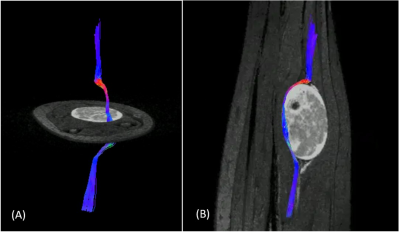 |
Computer Number: 97
2054. Utility
of 7T MRI and Diffusion Tractography in Preoperative Planning
for Peripheral Nerve Sheath Tumors
Z. Zhen, Y-C Hsu, Y-H Chu, Z. Liu
7T Magnetic Resonance Imaging Translational Medical Center, Department of Radiology, Southwest Hospital, Third Military Medical University (Army Medical University), Chongqing, China
Impact: We highlight the potential of 7T DTI
tractography to enhance surgical planning for peripheral
nerve sheath tumors by precisely mapping tumor-nerve
relationships, improving preoperative visualization, and
ultimately supporting better patient outcomes with minimal
nerve damage.
|
|
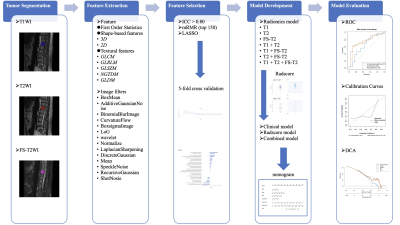 |
Computer Number: 98
2055. Multimodal
MRI-based clinical radiomics model for predicting postoperative
anemia in patients with spinal metastases
W. Zhao, N. Lang
Peking University Third Hospital, Beijing, China
Impact: Accurate prediction of postoperative anemia in
patients with symptomatic spinal metastases is crucial for
effective management, and the model incorporating clinical
and Radscore factors is capable of enhancing treatment
planning and outcomes.
|
|
|
Computer Number:
2056. WITHDRAWN |
||
 |
Computer Number: 99
2057. Assessing
Response to Neoadjuvant Radiotherapy and Targeted Therapy in
Soft Tissue Sarcoma by IVIM-DWI-derived Tumor Habitat
Characteristics
X. Wen, J. Jiang, S. Wang, Y. Jiang, Y. Song, N. Lu, M. Li
Department of Radiology, National Cancer Center/National Clinical Research Center for Cancer/Cancer Hospital, Chinese Academy of Medical Sciences and Peking Union Medical College, Bei Jing, China
Impact: This study demonstrates that IVIM-based models
offer a high-accuracy, non-invasive diagnostic approach for
early assessment of treatment response in neo-RT and
targeted therapy for STS, supporting personalized treatment
strategies.
|
|
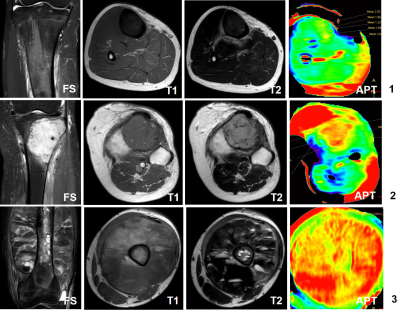 |
Computer Number: 100
2058. A
pilot application of APT and DWI in differentiating benign and
malignant bone and soft tissue tumors: a prospective study
X. Liu, P. Li, P. Shang, J. Lu, K. Ai, X. Ma
Honghui Hospital affiliated to Xi'an Jiaotong University, Xi’an, China
Impact: APT and DWI have better qualitative diagnostic
value in benign and malignant bone and soft tissue tumors.
We preliminarily analyzed APT imageimages of benign and
malignant tumors, whether various tumors have different APT
values needs to be further studied.
|
|
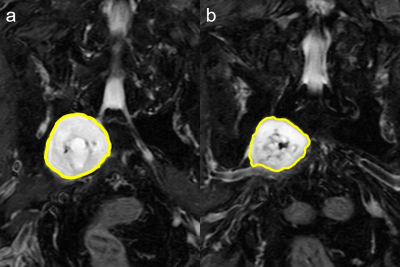 |
Computer Number: 101
2059. Application
of MR Neurography and T2 Mapping to Neurogenic Tumors:
Qualitative and Quantitative Analysis
M. Arai, T. Nozaki, J. Tsuzaki, M. Hase, D. Ito, R. Tsukada,
T. Habe, H. Mori, E. Arai, M. Yoneyama, Y. Yamada, M.
Jinzaki
Keio University School of Medicine, Tokyo, Japan
Impact: This study highlights MIXTURE MRI's potential to
improve neurogenic tumor assessment through rapid,
comprehensive imaging. Findings support further research on
Antoni A components and could refine diagnostic protocols,
aiding clinicians in evaluating tumor malignancy and
optimizing patient management.
|
|
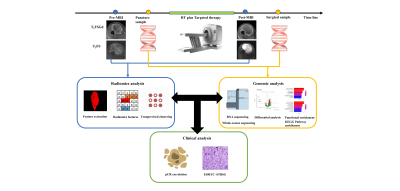 |
Computer Number: 102
2060. Integrating
MRI Delta-radiomics and Transcriptomics to Assess Neoadjuvant
Radiotherapy plus Targeted Therapy in Soft Tissue Sarcoma
L. Miao, L. Yang, J. Jiang, S. Wang, M. Li, X. Li, N. Lu
Cancer Hospital, Chinese Academy of Medical Sciences and Peking Union Medical College, Beijing, China
Impact: The integration of radiomics and transcriptomics
in this study has revolutionized the understanding of STS,
providing a non-invasive approach to uncover the genetic
basis of disease. This fusion offers a comprehensive view of
disease mechanisms, which can enhance personalized
treatment.
|
|
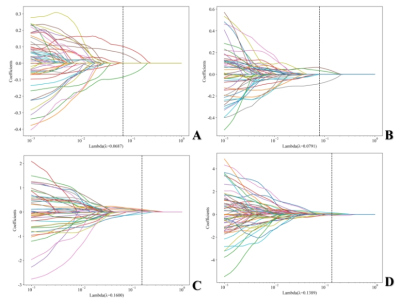 |
Computer Number: 103
2061. Thoracolumbar
MRI-Based Spinal Radiomics Model Predict Risk Stratification of
Multiple Myeloma: A Pilot Machine Learning Study
W. Hao, F. Zheng, Y. Wang, Q. Hao, P. Yin, N. Hong
Peking University People's Hospital, Beijing, China
Impact: This piolt study is the fundation to prove the
dependency of thoracolumbar spine models with MM prognosis.
We will combined different clinical data based on the chosen
models for further multiple center research.
|
|
 |
Computer Number: 104
2062. Time-Dependent
Diffusion MRI to Distinguish Malignant From Benign Bone Tumors
Y. Li, C. Ren, J. Cheng, Y. Zhang, W. Zhang, L. Lin
The First Affiliated Hospital of Zhengzhou University, Zhengzhou, China
Impact: The td-dMRI technology links the diffusion-time
dependence of water diffusion in living cells to specific
microstructural parameters. ADC values derived from td-dMRI
at different gradient oscillation frequencies showed
potential diagnostic value for clinical
differentiation between benign and malignant bone tumors.
|
|
 |
Computer Number: 105
2063. Quantifying
Cell Size in Osteosarcoma Using IMPULSED-Based Time-Dependent
Diffusion MRI
Z. Zhang, X. Li, X. Zhou, H. Ma, X. Zhao, S. Ai
Shanghai Ninth People's Hospital, Shanghai Jiao Tong University School of Medicine, Shanghai, China
Impact: IMPULSED method may be one of the tools for
accurate and noninvasive evaluation of the efficacy of
preoperative neoadjuvant chemotherapy in osteosarcoma
patients, which helps to adjust the medication in time and
observe the tumor progression.
|
|
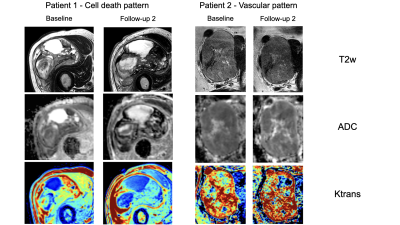 |
Computer Number: 106
2064. Distinct
Biological Response Patterns During Neoadjuvant Radiation
Therapy in Soft Tissue Sarcoma: A Multiparametric MRI Clustering
Analysis
B. Bogner, A. Runkel, S. Reiss, M. Reisert, J. Weiss, F.
Bamberg, T. Diallo, M. Jung
University Medical Center Freiburg, Freiburg, Germany
Impact: This analysis reveals distinct biological
response phenotypes during radiation therapy that can be
identified through non-invasive imaging. These findings
could enable early response prediction and therapy
adaptation, potentially improving patient outcomes through
personalized treatment approaches.
|
|
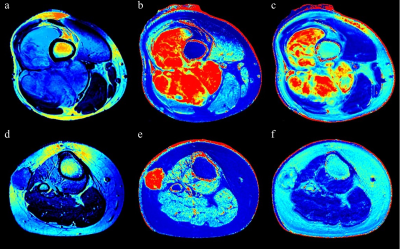 |
Computer Number: 107
2065. Whole-Tumor
Histogram Analysis of Synthetic MRI for the Differentiation of
Benign and Malignant Soft-Tissue Tumors
L. Miao, J. Jiang, S. Wang, G. Quan, X. Li, M. Li
Cancer Hospital, Chinese Academy of Medical Sciences and Peking Union Medical College, Beijing, China
Impact: This
inaugural application of SyMRI for STTs presents a
non-invasive diagnostic alternative with high accuracy,
supporting clinical decision-making and personalized
medicine in STT diagnosis.
|
|
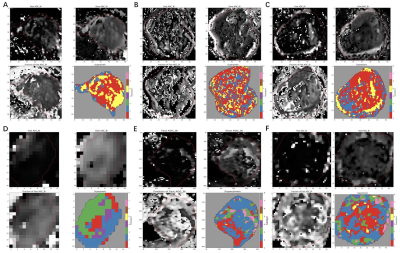 |
Computer Number: 108
2066. Enhancing
Predictive Accuracy of Neoadjuvant Chemotherapy Response in
Osteosarcoma Using Habitat Analysis of IVIM and DCE-MRI
P. Yin, N. Hong, J. Ren
Peking University People's Hospital, Beijing, China
Impact: This research highlights the utility of
multiparametric MRI in predicting chemotherapy responses,
paving the way for personalized treatment strategies and
improved clinical outcomes for osteosarcoma patients. Future
studies could further explore imaging biomarkers in diverse
tumor subtypes.
|
|
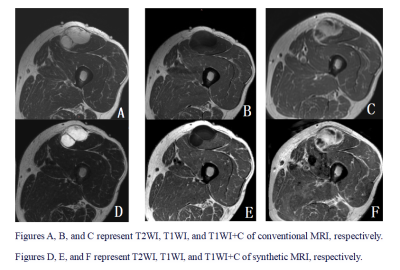 |
Computer Number: 109
2067. MRI
Evaluation of Soft Tissue Tumors: Comparison of Synthetic MRI
and Conventional MRI in Tumor Signal Characteristics, Resolution
J. Zhou, Y. Dai, Z. Xu, S. Wang, Y. Long, W. Wang
Dalian Municipal Central Hospital, Dalian, China
Impact: In tumor examination protocols, synthetic MRI
sequences can replace the four conventional MRI
cross-sectional sequence scans
|
|
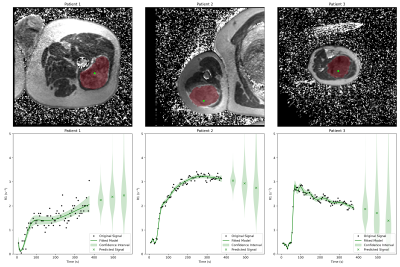 |
Computer Number: 110
2068. Gaussian
Processes for Enhancing DCE Imaging Quality and Probabilistic
Interpretation of Non-Parametric Biomarkers in Soft-Tissue
Sarcomas
Y. Guo, I. Thrussell, M. Morris, J. Winfield, D. Collins, N.
Somaiah, D-M Koh, N. Rosenfelder, C. Messiou, M. Blackledge
The Institute of Cancer Research, London, United Kingdom
Impact:
Gaussian Process modelling of DCE-MRI curves in soft-tissue sarcomas provides uncertainty quantification and reduces image noise, potentially enhancing the characterization of tumour heterogeneity. This approach may offer opportunities for predictive imaging and personalized treatment planning. |
|
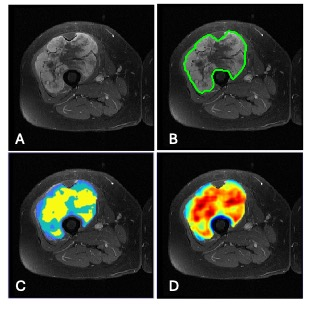 |
Computer Number: 111
2069. Application
of MR-based Nested Habitat Radiomics for Predicting 1-Year PFS
in Soft Tissue Sarcoma Patients Receiving Preoperative
Radiotherapy
Y. Zhang, I. Choi, E. Ku, M. Shi, N. Peterson, M-y Su, J.
Harris
University of California, Irvine, United States
Impact: The nested habitat radiomics approach offers a
non-invasive method to identify aggressive tumor regions,
potentially transforming clinical practice by enabling
personalized risk assessment. This could guide tailored
treatment plans, improve patient outcomes, and reduce
recurrence rates in soft tissue sarcoma management
|
The International Society for Magnetic Resonance in Medicine is accredited by the Accreditation Council for Continuing Medical Education to provide continuing medical education for physicians.